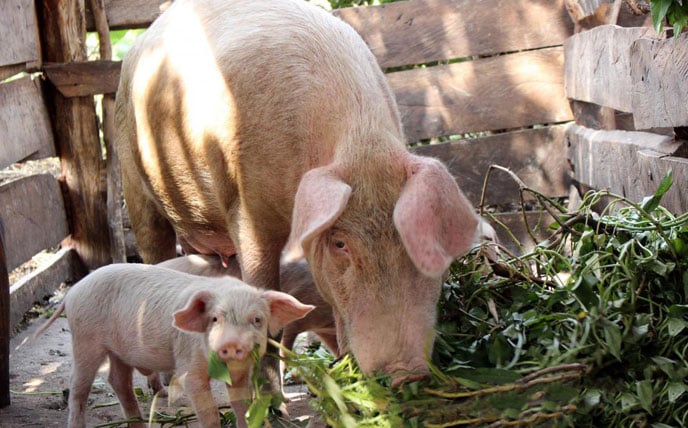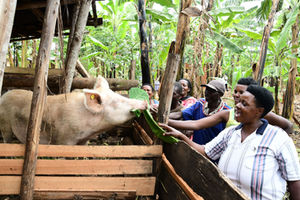
Pigs can eat all kinds of scraps, or leftover food such as mealie-pap, bread, vegetables, fruit and pig pellets. Photos | NMG
Exploring the realm of organic pig farming reveals a promising horizon where sustainability meets profitability. Harnessing the power of natural practices, organic pig farming emerges as a beacon of eco-friendly agriculture. In this paradigm shift, meticulous attention to ethical and environmentally conscious methods intertwines with economic viability.
Organic pig farming is a sustainable method of raising pigs that respects their natural behaviour, health, and welfare while protecting the environment and conserving resources.
It involves providing outdoor areas for pigs to forage, root, and wallow, feeding them organic feed free of antibiotics, hormones, and GMOs, and providing comfortable shelters.
Organic pig farming benefits both farmers and consumers, as farmers can earn premium prices for their pork and reduce their reliance on external inputs, while consumers can enjoy tasty, nutritious, and safe pork.
Pig farming stands out as a highly sustainable industry, thriving even in harsh conditions due to the resilience of pigs. Primarily reared for their meat and skin, including bacon, ham, and gammon, pigs offer an efficient food conversion ratio.
The demand for organic pig feed is significant, driven by the desire to raise healthy pigs. While access to the outdoors is vital for organic pigs, raising them on a farm under organic regulations is not mandatory. Clean and organic bedding, often sourced from crop residue in comprehensive crop rotations, ensures the wellbeing of organic pigs.
The benefits of organic pig farming
Organic pig farming presents many advantages, contributing to its appeal as a lucrative and sustainable endeavor.
Unlike many other meat-producing animals, pigs exhibit the highest improved feed efficiency. Pigs display remarkable versatility in their diet, consuming a wide array of feedstuffs such as forages, seeds, degraded feed, and even waste, transforming these into valuable, nutritious meat.
Despite the potential for lower feed quality with unconventional rations, the adaptability of pigs remains a key asset.
Their short generation cycles add to the allure of pig farming, with sows capable of farrowing twice a year and producing 6 to 12 piglets per farrowing. Additionally, pig farming requires a relatively modest investment in equipment and facilities, making it accessible to many enthusiasts. Beyond financial benefits, pig farming offers employment opportunities and positions individuals as leaders in their own right.
Embarking on pig farming provides economic independence and the potential for passive income, allowing individuals to be their bosses. The simplicity of getting started, even as a part-time venture, underscores the accessibility of this agricultural pursuit. Furthermore, pig farming opens the door to establishing a business monopoly. Organic pig farming represents a promising avenue for economic growth, self-sufficiency, and success in the agricultural landscape.
How to implement
Organic pig farming is a sustainable method of animal husbandry that focuses on producing high-quality pork products while ensuring the welfare and health of the pigs. It follows specific principles and standards governing pigs’ management, housing, feeding, breeding, and health care.
This article will introduce key aspects of organic pig farming, including choosing the right breeds, creating a healthy environment, providing proper nutrition, managing waste and manure, controlling and preventing diseases, and optimising reproduction and breeding.

How to choose right breeds
Organic pig farming involves selecting suitable breeds based on adaptability, productivity, health, and behaviour.
• Berkshire, a black pig with white markings, is known for its high meat quality, marbling, and flavour.
• Tamworth, a red pig with a long snout and erect ears, is active, intelligent, and forages well on pasture.
• Large black, a large pig with a black coat and lop ears, is calm and friendly, thrives on outdoor systems, has good mothering abilities, high milk production, and excellent meat quality.
• Duroc, a red or brown pig with drooping ears, is fast-growing and efficient, producing lean and tender meat.
To obtain hybrid vigour, cross different breeds to combine desirable traits from both parents. For example, a Berkshire and a Duroc can produce a pig with high meat quality and a fast growth rate. By considering these factors, organic pig farming can be a successful and sustainable practice.
Creating a healthy environment
Organic pig farming requires a healthy and natural environment for the pigs. This includes providing adequate space for piglets, weaners, growers/finishers, and sows, with minimum requirements varying based on age and weight.
Outdoor access should be provided for grazing, rooting, and exploring, with secure fencing and adequate shade, shelter, water, and feed sources.
Comfortable bedding with organic materials such as sawdust and wood shavings should be provided for pigs to rest and nest. These measures ensure the pigs can freely move and express their natural behaviours without overcrowding.
Providing proper nutrition
One of the main challenges of organic pig farming is to provide adequate and balanced nutrition for the pigs, using only organic feed ingredients.Organic pigs need a diet that meets their energy, protein, mineral, and vitamin requirements, depending on their age, stage of production, and environment.
The main ingredients in organic pig feed are cereals (such as wheat, barley, oats, or maize), legumes (such as peas, beans, or soybeans), oilseeds (such as sunflower or rapeseed), and forages (such as grass, clover or alfalfa).
Some organic farmers supplement their pigs’ diet with alternative feeds, such as fruits, vegetables, roots, tubers, nuts, or seeds.
These feeds can provide additional nutrients and diversity to the pigs’ diet and reduce feed costs and waste.
However, they should be used with caution, as they may also contain harmful substances (such as pesticides or toxins), pathogens (such as bacteria or parasites), or anti-nutritional factors (such as tannins or lectins). Organic pigs also need access to clean and fresh water at all times.
Water is essential for the pigs’ digestion, metabolism, thermoregulation, and health. Water quality and quantity should be monitored regularly, and water sources should be protected from contamination and pollution.

Identifying pigs through tagging is an essential skill for pig farmers.
How to manage waste and manure
Organic pig farming requires sustainable and environmentally friendly management of waste and manure. These resources provide organic matter and nutrients for soil and crops but can also pose environmental and human health risks.
An integrated approach should be adopted to manage waste and manure effectively, considering source reduction, collection, and treatment.
Source reduction involves optimising feed intake, minimising water consumption, and avoiding overstocking or overcrowding.
Collection involves collecting waste and manure from pigs’ housing or outdoor areas, using appropriate equipment and methods to prevent spillage or leakage. The collected waste should be stored in containers or structures that prevent rain, sun, or wind exposure.
How to control and prevent diseases
Disease control and prevention in organic pig farming are for maintaining the health and wellbeing of the livestock.
Organic pig farming often relies on natural methods, avoiding synthetic medications and antibiotics. Implementing strict biosecurity measures, such as quarantine protocols for new animals, regular health checks, and maintaining a clean and sanitary environment, is fundamental.
Proactive disease prevention involves strategic vaccination programs, emphasising organic and natural vaccines whenever possible. Proper nutrition, focusing on balanced organic diets, boosts the immune system, reducing disease susceptibility.
Regular monitoring, and early detection of symptoms are vital in controlling potential outbreaks. Integrating herbal supplements known for their immune-boosting properties can also be considered in disease prevention strategies.
Reproduction
Efficient reproduction and breeding practices are essential for the success of organic pig farming. Organic methods prioritise natural breeding processes without resorting to artificial hormones.
Selection of high-quality breeding stock based on genetic traits, health, and reproductive performance is critical.
Optimising reproduction involves carefully managing sow nutrition, ensuring proper housing conditions, and maintaining a stress-free environment.
Monitoring the estrus cycle and implementing controlled mating techniques contribute to successful breeding outcomes. Natural farrowing practices, with minimal intervention, align with organic principles.
Organic pig feeds
Organic pig farming prioritises the use of natural ingredients in pig feed. The feed aims to support the pigs’ health and wellbeing while adhering to organic principles.
Common organic feed ingredients include forages, seeds, and degraded feed. Organic pigs are not treated with antibiotics routinely, in contrast to non-organic counterparts, ensuring a more natural and healthy approach to farming.
Design of organic pig farms
In organic pig farming, farm design plays a role in promoting the wellbeing of the animals. Providing outdoor access year-round is standard practice, although indoor housing is allowed during severe weather conditions.
Maintaining proper distances between pig farms and different age groups is essential to prevent the spread of diseases. Adequate ventilation and avoiding overcrowding contribute to disease prevention and better performance.
Benefits
Organic pig farming offers producers premium prices, promoting excellent animal welfare and environmental benefits. The demand for organic products is rising, aligning with consumer preferences for local, sustainable, and environmentally friendly food.
Diet
Organic pigs need a diet that meets their energy, protein, mineral, and vitamin requirements, depending on their age, stage of production, and environment.




